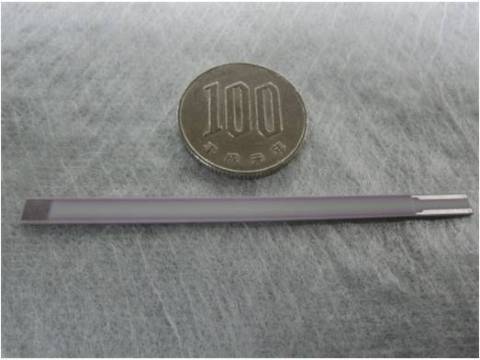|
02.11.2015 14:07:00
|
KYOCERA Develops World's First Platinum-Free Soot-Sensing Element for Diesel Engines
Kyocera Corporation (President: Goro Yamaguchi) today announced that it has developed a sensing element to help monitor soot filters in diesel-engine vehicles — the first ever*1 to withstand operating temperatures above 500°C without the use of platinum. Awarded in the Green Innovation*2 category at the CEATEC JAPAN 2015 tradeshow, the new product utilizes a new base-metal alloy to withstand higher temperatures while reducing production costs and helping to improve air pollution from engine emissions.
This Smart News Release features multimedia. View the full release here: http://www.businesswire.com/news/home/20151102005694/en/

World's first platinum-free soot-sensing element (length: 67mm; width: 4mm; thickness: 1mm) for diesel engines developed by Kyocera and a Japanese 100-yen coin (Photo: Business Wire)
As environmental regulations grow more stringent, soot sensors are expected to become necessary for monitoring diesel engine emissions. Most sensing elements for soot sensors currently in development by other companies utilize conductors made of platinum, which can resist oxidation at high temperature. However, platinum can cause catalytic reactions with soot — and at very high temperatures, can even cause soot to burn. Kyocera has overcome these problems by developing a new base-metal alloy to replace platinum in its new element, which the company plans to further develop, with samples available in January 2017.
Main Features
1. Withstanding operating temperatures over 500°C
As the world’s leading provider of ceramic microelectronic packages (market share: approx. 70%), Kyocera has developed an extensive portfolio of technologies relating to base-metal conductors and ceramic metallization. By utilizing a conductor made from a proprietary base-metal alloy instead of platinum, Kyocera has developed a sensing element that can detect soot at high operating temperatures. Even at extreme high temperatures, significantly over 500°C, the sensing element can be used depending on the specific application. Furthermore, with a durable structure built by laminating and co-firing thin layers of ceramic with the newly developed base-metal alloy, it is designed to offer maximum long-term reliability.
2. Contributing to the reduction of air pollution from engine emissions
Soot sensors are designed to measure the level of particulates in diesel exhaust and detect cases in which soot emissions exceed regulatory limits. By notifying the driver when the filter becomes compromised, this sensing element can help reduce air pollution and create a cleaner environment through practical application.
3. Reducing costs through material innovation
In addition to its high-temperature performance advantages, the new sensing element reduces costs by replacing platinum, a precious metal, with Kyocera’s proprietary base-metal alloy. Kyocera aims to expand use of the newly developed material as an alternative to platinum, for applications such as gas sensors and packaging of high-temperature devices.
Development Background
Diesel engines generate less CO2 emissions than conventional gas engines, while offering superior torque characteristics and outstanding long-term durability. Due to these advantages, the use of diesel-engine vehicles has experienced significant growth in Europe, where its share among passenger cars exceeds 50 percent*3. In addition to passenger cars, diesel engines are widely used worldwide for various applications, for example in the United States where diesel engines power more than two-thirds of all farm equipment, three-fourths of heavy construction equipment, the majority of freight trucks, and about 55 percent of school buses*4.
Consequently, diesel emission regulations are growing more stringent. European emissions standards already require pollution control systems such as soot-collecting Diesel Particulate Filters (DPFs) in diesel-engine vehicles. However, sensors for monitoring filter performance are still under development by various companies for practical application.
Future emission regulations are expected to mandate soot sensors as an essential component of diesel engine vehicles. Kyocera remains committed to utilizing its technology to address environmental issues and will continually develop its sensing element to meet the needs of the industry.
*1 Based on research by Kyocera (as of October 1, 2015).
*2 CEATEC
Award 2015; Semi-Grand Prix (first runner-up) in the Green Innovation
Category.
*3 Based on data compiled by the European Automobile
Manufacturers Association.
*4 Based on data compiled by the Diesel
Technology Forum.
For photos, please visit: http://global.kyocera.com/news/2015/1101_mvof.html
About KYOCERA
Kyocera Corporation (NYSE:KYO)(TOKYO:6971) (http://global.kyocera.com/), the parent and global headquarters of the Kyocera Group, was founded in 1959 as a producer of fine ceramics (also known as "advanced ceramics”). By combining these engineered materials with metals and integrating them with other technologies, Kyocera has become a leading supplier of electronic components, semiconductor packages, solar power generating systems, mobile phones, printers, copiers, cutting tools, and industrial ceramics. During the year ended March 31, 2015, the company’s net sales totaled 1.53 trillion yen (approx. USD12.7 billion). Kyocera appears on the latest listing of the "Top 100 Global Innovators” by Thomson Reuters, and is ranked #552 on Forbes magazine’s 2015 "Global 2000” listing of the world’s largest publicly traded companies.
View source version on businesswire.com: http://www.businesswire.com/news/home/20151102005694/en/
 Der finanzen.at Ratgeber für Aktien!
Der finanzen.at Ratgeber für Aktien!
Wenn Sie mehr über das Thema Aktien erfahren wollen, finden Sie in unserem Ratgeber viele interessante Artikel dazu!
Jetzt informieren!
Nachrichten zu Kyocera Corp.mehr Nachrichten
|
19.01.25 |
Erste Schätzungen: Kyocera legt Zahlen zum jüngsten Quartal vor (finanzen.net) | |
|
29.10.24 |
Ausblick: Kyocera legt die Bilanz zum abgelaufenen Quartal vor (finanzen.net) | |
|
15.10.24 |
Erste Schätzungen: Kyocera öffnet die Bücher zum abgelaufenen Quartal (finanzen.net) | |
|
31.07.24 |
Ausblick: Kyocera zieht Bilanz zum jüngsten Jahresviertel (finanzen.net) |
Analysen zu Kyocera Corp.mehr Analysen
Aktien in diesem Artikel
| Kyocera Corp. | 9,76 | 5,08% |
|
Börse aktuell - Live Ticker
Asiens Börsen in GrünDie Börsen in Fernost notieren zum Wochenstart deutlich im Plus.